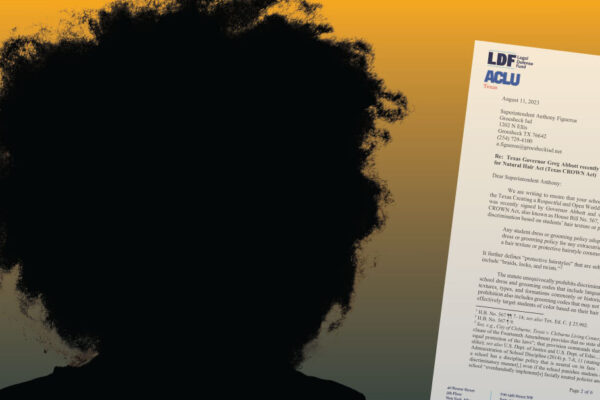HOUSTON — The ACLU of Texas joined the ACLU, ACLU of Louisiana, ACLU of Mississippi, and IDRA to file a friend-of-the-court brief before the U.S. Court of Appeals for the Fifth Circuit in support of Darryl George — who was suspended from Barbers Hill Independent School District in Mont Belvieu, Texas for wearing his hair in long locs. The brief asks the court to recognize that the district’s boys-only hair restriction likely violates the Equal Protection Clause as unconstitutional sex discrimination.
George was first suspended from Barbers Hill ISD in 2023 and has had his high school education upended by the district’s discriminatory dress code. Two other students, De’Andre Arnold and Kaden Bradford, sued the district for disciplining them for wearing long locs. The ACLU of Texas, IDRA, and other civil rights organizations filed a separate friend-of-the-court brief this past December supporting George and his family in a state court case. In that brief, they argue that Barbers Hill ISD is also violating the Texas CROWN Act, which prohibits discrimination against hair textures and protective hairstyles commonly or historically associated with race.
The new brief filed yesterday explains why Barbers Hill ISD’s boys-only hair restriction is subject to heightened scrutiny under Supreme Court and Fifth Circuit case law. As the brief explains, “Heightened scrutiny applies to all government-drawn sex classifications . . . [and] boys-only hair-length rules like BHISD’s cause substantial harm to George and other students.” Other courts across the country have invalidated gender-based dress codes under the Equal Protection Clause, including cases brought by the ACLU and its affiliates such as Peltier v. Charter Day School and A.C. v. Magnolia ISD.
“Neither Darryl George nor any student should have their education disrupted because of the way they wear their hair — and they shouldn’t have to go to court just to attend school,” said Chloe Kempf (she/her), staff attorney at the ACLU of Texas. “Gender-based discrimination has no place in our schools. It’s unconstitutional and makes students feel unsafe and unwelcome. No matter their race, religion, or gender, all students deserve the freedom to be themselves in the classroom, free from discrimination.”
“We must remain vigilant to restrictions on bodily freedom,” said McKenna Raney (she/they), LGBTQ Staff Attorney of the ACLU of Mississippi. “This is especially true when those restrictions limit or exclude students from participation in school, as is the case here.”
“No student should be forced out of school because of their identity. BHISD’s boys-only hair-length rule punishes students for expressing their cultural and religious heritage and disproportionately targets students of color,” said Jennesa Calvo-Friedman (she/her), senior staff attorney for the ACLU’s Women’s Rights Project. “BHISD’s policy entrenches the sex stereotype that boys should wear short hair (and only girls wear long hair), which reflects the archaic concept that gender should or does determine appearance, including hairstyle.”
"Darryl George has a right to wear protective Black hairstyles that represent his culture and heritage in school. Anything else is blatant discrimination against not only Black students, but male students who decide to wear their hair long," said Nora Ahmed (she/her), legal director of the ACLU of Louisiana. "The ACLU of Louisiana is proud to file this amicus brief in support of Darryl George."
Disproportionate discipline can have devastating consequences and falls particularly hard on Black, Latino, and Indigenous students. When students like Darryl George are removed from their classrooms and placed in suspension or alternative school, they miss crucial hours of classroom instruction and suffer an increased risk of negative educational outcomes, dropouts, and incarceration.
A report published earlier this year by the ACLU of Texas and partners showed that a majority of districts that had boys-only hair restrictions in 2020 have since abandoned those policies, and Barbers Hill ISD is part of an ever-shrinking minority of Texas school districts to have a dress code that discriminates based on gender, which often leads to discrimination based on race, religion, and other characteristics.
Access a copy of the brief here: www.aclutx.org/sites/default/files/filed._2025.02.11_george_amicus_brief._comms.pdf
Related Content
ACLU of Texas, Partners Urge Texas Court to End Hair Discrimination in Darryl George Case
Stay Informed
Sign up to be the first to hear about how to take action.
By completing this form, I agree to receive occasional emails per the terms of the ACLU’s privacy statement.
By completing this form, I agree to receive occasional emails per the terms of the ACLU’s privacy statement.


